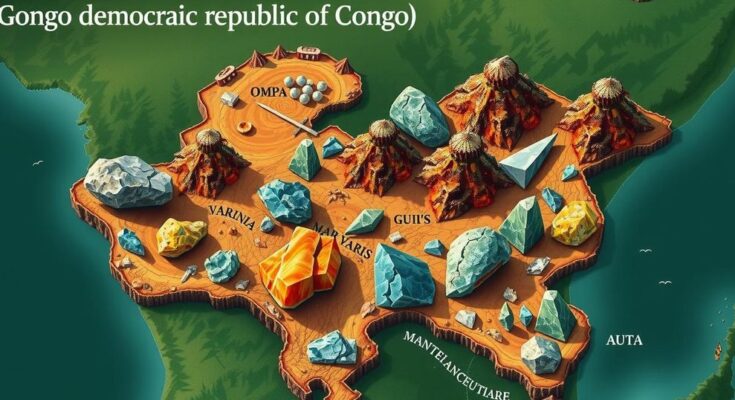The Democratic Republic of the Congo is negotiating a mining deal with the U.S. to secure support against Rwandan-backed M23 rebels. The agreement would provide U.S. access to vital minerals while aiming to counter Chinese dominance. Calls for transparency in negotiations have emerged due to governance concerns, with experts cautioning about the deal’s feasibility and its impact on the Congolese economy.
The Democratic Republic of the Congo (DRC) is reportedly in the initial stages of negotiating a mining resources agreement with the United States, aimed at garnering support against the M23 rebel group and Rwandan military incursions in the east of the country. This proposed agreement would grant the U.S. access to the DRC’s vast mineral reserves, which include cobalt, coltan, copper, and lithium, crucial for technology sectors, including defense and energy.
The U.S. State Department has expressed willingness to explore a mining partnership in the DRC, as confirmed by Congolese presidential officials. The potential deal could impede Rwanda’s influence as it supports the M23 rebels, who are currently conducting significant military operations in eastern DRC, which has put Congolese forces under considerable strain.
In an interview with The New York Times, Congolese President Felix Tshisekedi proposed to the U.S. and Europe a stake in the DRC’s mineral wealth, which is largely dominated by Chinese interests. The Congolese president anticipates that Western involvement may bolster his country’s security and stability amidst ongoing tensions with Rwanda.
Tshisekedi’s proposition followed a letter sent to Secretary of State Marco Rubio by a Congolese senator outlining a strategic partnership that would involve U.S. access to DRC minerals, operational control of a deep-water port, and military training for Congolese forces. The letter criticized the current United Nations peacekeeping operations as ineffective and suggested strengthening U.S.-Congolese military cooperation.
Experts are cautious about the feasibility of this proposed deal. Jason K. Sterns emphasized that, while the Congolese army faces challenges, the realistic deployment of U.S. troops may contradict Trump’s agenda of bringing forces home. There is concern that negotiations, driven by security emergencies, may not adequately protect the Congolese economy.
Jean Pierre Okenda, a mining expert with La sentinelle des ressources naturelles, called attention to the governance issues tied to these discussions, arguing they should be transparent and submitted for parliamentary approval to ensure the population benefits. Meanwhile, a Congolese government spokesperson clarified that the DRC seeks to diversify partnerships rather than trade its mineral wealth for security.
The push for a U.S. agreement is perceived as a strategic move against China, which currently dominates DRC’s mining sector. Despite Tshisekedi’s visibility to Western allies, he maintains a complex relationship with China through continued negotiations to address past agreements.
While discussions between U.S. and Congolese officials continue, it remains uncertain whether American mining companies can effectively enter the DRC market, given previous tensions. The U.S. interest in DRC’s minerals is evident, demonstrated by previous initiatives aimed at countering Chinese dominance in the region.
As the negotiations proceed, Congolese officials remain optimistic about the potential outcomes, emphasizing the importance of ensuring that any agreements are mutually beneficial, and serve to enhance the security and economic stability of the DRC.
The potential agreement between the Democratic Republic of the Congo and the United States regarding mining resources represents a strategic maneuver in the face of ongoing threats from M23 rebels and Rwanda. As discussions progress, there is a clear need for transparency and governmental oversight to ensure that the agreement serves the interests of the Congolese populace, rather than merely political gains. The outcomes of this venture could redefine the balance of influence between major global powers in the DRC’s rich mineral landscape.
Original Source: www.france24.com




